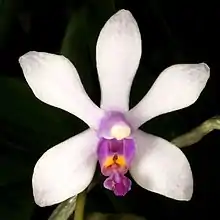Phalaenopsis wilsonii
Phalaenopsis wilsonii, also known as 华西蝴蝶兰 (hua xi hu die lan) in Chinese, is a species of epiphyte in the family Orchidaceae, native to China, Tibet, Myanmar and Vietnam.[1] Additionally it has been recorded in India.[2]
| Phalaenopsis wilsonii | |
|---|---|
 | |
| Flower detail | |
| Scientific classification | |
| Kingdom: | Plantae |
| Clade: | Tracheophytes |
| Clade: | Angiosperms |
| Clade: | Monocots |
| Order: | Asparagales |
| Family: | Orchidaceae |
| Subfamily: | Epidendroideae |
| Genus: | Phalaenopsis |
| Species: | P. wilsonii |
| Binomial name | |
| Phalaenopsis wilsonii Rolfe | |
| Synonyms | |
| |
.jpg.webp)
.jpg.webp)
Description
The 1 cm long stems produce 4-5 oblong to subelliptic, 6.5-8 cm long and 2.6-3 cm wide leaves and greenish, well developed, dorsiventrally flattened, verrucose roots. The leaves often show purple colouration of the abaxial surface and they are shed before flowering, but sometimes 1-2 leaves persist. Flowering occurs throughout April to July. Widely and simultaneously opening, pink flowers are produced on 1-2 suberect or arching, 10-15 flowered racemes. The plants are epiphytes or lithophytes on damp rock found at elevations of 800-2200m a.s.l.[3] The chromosome count is 2n = 2x = 36.[4]
Taxonomy
This species is placed within the subgenus Aphyllae, which is characterised by deciduous leaflessness. A source of taxonomic confusion has been the missapplication of this species name to Phalaenopsis honghenensis.[5] Phylogenetic analysis indicated Phalaenopsis wilsonii was closely related to Phalaenopsis lowii.[6]
Conservation
This species has been categorized as vulnerable in China Species Red List.[7] It is protected unter the CITES appendix II regulations of international trade.[8]
References
- "Phalaenopsis wilsonii Rolfe | Plants of the World Online | Kew Science". powo.science.kew.org. Retrieved 1 March 2022.
- Kamba, J., & Deb, C. R. (2021). Phalaenopsis wilsonii (Orchidaceae: Epidendroideae: Vandeae), a new record for India. Rheedea.
- Wu, Z., Raven, P. H. (2009). Flora of China. United States: Science Press.
- Lee, Y. I., Chung, M. C., Kuo, H. C., Wang, C. N., Lee, Y. C., Lin, C. Y., ... & Yeh, C. H. (2017). The evolution of genome size and distinct distribution patterns of rDNA in Phalaenopsis (Orchidaceae). Botanical Journal of the Linnean Society, 185(1), 65-80.
- Christenson, E. A. (2001). Phalaenopsis: a monograph. Timber Press (OR).
- Fan, Z. F., Yu, D. Y., & Ma, C. L. (2021). The complete chloroplast genome sequence of Phalaenopsis wilsonii Rolfe, a vulnerable wild moth orchid species (Orchidaceae). Mitochondrial DNA Part B, 6(10), 2903-2905.
- Wang S, Xie Y. 2004. China species red list. Beijing (China): Higher Education Press.
- "Phalaenopsis". CITES.